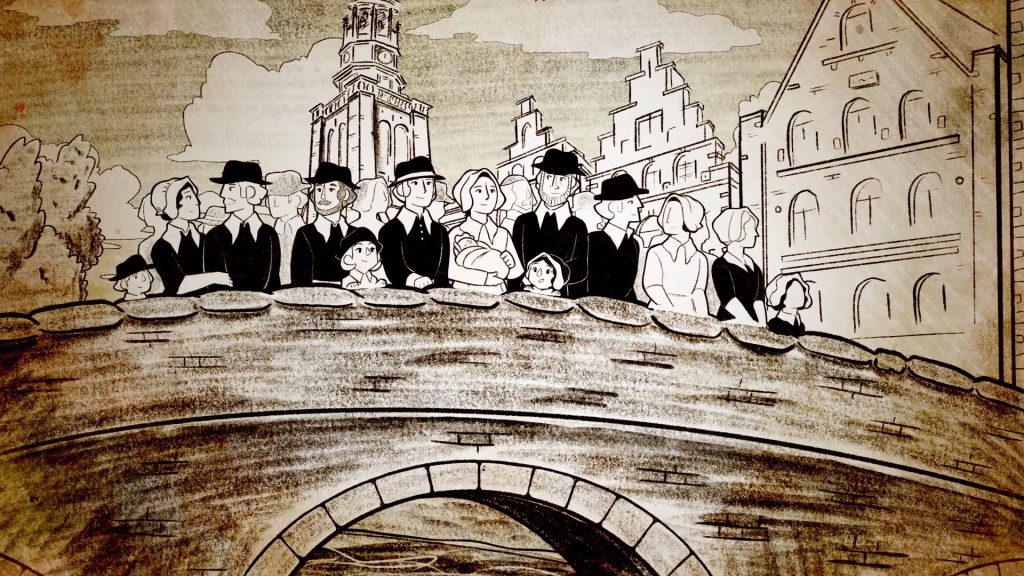Arriving in Amsterdam

Eventually, the Pilgrims all made their way to Holland after managing to escape from England in the summer of 1608. Their journeys so far had, according to their chronicler William Bradford, captured the popular imagination:
“For by these so public troubles, in so many eminent places, their cause became famous.”
Bradford recalled the opposition they had met up to that point, and reflected on the joy they all felt when they were all reunited in Amsterdam:
“In the end, notwithstanding all these storms of opposition, they all got over at length [to Holland], some at one time & some at another, and some in one place & some in another, and met together again … with no small rejoicing.”
Their experiences in Holland were, by Bradford’s account, very different to what they had known in England. The Pilgrims had come from rural settlements and were now living in a bustling port city, with different trades, cultures and a foreign language to get used to.
“Being now come into the Low Countries, they saw many good & fortified cities, strongly walled and guarded with troops of armed men. Also they heard a strange & uncouth language, and beheld the different manners & customs of the people, with their strange fashions and attires; all so far differing from … their plain country villages (where they were bred, & had so long lived) as it seemed they were come into a new world.”
Such thoughts though did not apparently linger for long, as they were soon faced with the harsh realities of surviving as immigrants in a foreign land.
“But these were not the things they much [thought about]; for they had other work in hand, & another kind of war to wage & maintain.
For though they saw fair & beautiful cities, flowing with abundance of all sorts of wealth & riches, yet it was not long before they saw the grim & grisly face of poverty coming upon them like an armed man, with whom they must buckle & encounter, and from whom they could not fly; but they were armed with faith & patience … and though they were sometimes foiled, yet by God’s assistance they prevailed and got the victory.”
The strength of their faith was, according to Bradford, the thing that helped them carry on in a strange, new land. That faith though was also about to present them with a new set of challenges.
“Now when Mr. Robinson, Mr. Brewster, & other principal members were come over (for they were of the last & stayed to help the weakest over before them) such things were thought [about that] were necessary for their settling and best ordering of the church affairs.”
Arguments began to emerge among the Separatists who found themselves together in Holland, and the leaders did not always agree about how to organise their church. John Smyth (or Smith), the leader of the group from Gainsborough, for example, appears to have caused one of the Scrooby group’s leaders – John Robinson – to seek to move away from Amsterdam altogether.
“When they had lived at Amsterdam about a year, Mr. Robinson, their pastor, and some others … [saw] how Mr. John Smith and his company [had] fallen [out] with the church that was there before them … and … the flames of contention were likely to break out in that ancient church itself (as … came to pass); which things they [foresaw and] thought it was best to remove, before they were any way engaged with the same”
Robinson took his flock to the nearby city of Leiden in 1609, only a year after they first arrived in Amsterdam.
Next week: Immigrants – living in Leiden, City of Migrants…
Enjoying PilgrimAGE? Please leave us some feedback via the button below: